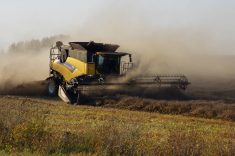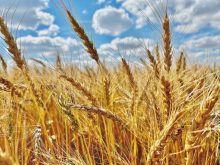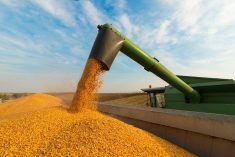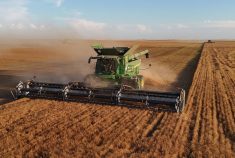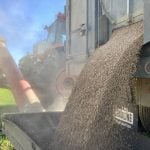A targeted campaign to lay out the benefits Alberta farmers get from their checkoff dollars has already yielded dividends for four checkoff-funded producer organizations in the province.
The Alberta Barley Commission, the Alberta Canola Producers Commission, the Alberta Pulse Growers Commission and the Alberta Winter Wheat Producers Commission launched their campaign in August 2009, partly to encourage farmer support for crop checkoffs, but also to ensure grain buyers doing business in Alberta deduct those checkoffs in the first place.
“Producer funding is crucial to our success, and through this campaign, we’ve adopted a strong and unified stance and the importance of their support,” Mike Leslie, CEO of the Alberta Barley Commission, said in a release Monday outlining the campaign’s progress to date.
Read Also

How Canada’s farmers are producing record crops despite droughts and floods
Western Canadian farmers are using minimum and zero-till farming, tile drainage, slow-release fertilizer, and better crop breeding to produce record crops despite drought conditions.
“Our producers have been urging us to work together and this campaign demonstrates the benefits of a collective effort.”
The campaign, meant to run into early 2010, included ads in each of the commissions’ newsletters and other materials distributed at events such as trade shows and regional meetings. Each partner commission has now seen “substantial results” from the campaign, the groups said in a joint release.
The barley commission, for one, said Monday it has doubled its licensed dealers in the past five months and increased checkoff dollar collection by more than $25,000.
The pulse crop and winter wheat growers’ commissions said they have also seen licensees and checkoff revenue increase.
Anyone who buys barley, pulse crops, winter wheat, canola or soft wheat in Alberta is required to have a license, issued by the province’s Agricultural Products Marketing Council.
Licensed buyers must deduct checkoff dollars from their payments to farmers, then submit the funds to the commission for the crop in question.
Projects
The four commissions said checkoff dollars allow them to leverage government and industry funding, attracting $7-$8 for every $1 of producer checkoff funds.
The funds are used to develop and improve crop varieties with stronger disease and pest resistance packages, improve and refine agronomic practices, and develop new domestic and export markets, the commissions said.
“Government and industry partners are much more likely to support our research, development, marketing and risk management projects when they see producers investing their checkoff dollars in priority areas,” Sheri Strydhorst, executive director of the Alberta Pulse Growers Commission, said in the groups’ release Monday.
But prior to the campaign’s launch in August, the commissions were finding that checkoff dollars weren’t always being deducted from grain transactions.
The pulse commission estimated that was happening less than 10 per cent of the time, but the barley and winter wheat commissions had estimated at the time that almost 50 per cent of the crop transactions in 2008 were sans checkoff.
The shortfall, the commission managers said in interviews in August, was generally coming from non-food users outside the mainline grain companies — livestock feeders, for example, who weren’t aware the checkoffs are also mandatory on their feed-grade wheat or barley purchases. The winter wheat commission had also seen some “slippage” in the ethanol sector.
The campaign has now also raised producers’ awareness of the value of checkoff dollars, the groups said.
“Growers are not always fully aware of the many activities our commissions are involved with,” Ward Toma, general manager of the Alberta Canola Producers Commission, said in Monday’s release.
“In our experience, once growers see the work we’re doing on their behalf, they see the value and power of their checkoff dollars. We hear this from growers who attend our regional meetings.”




